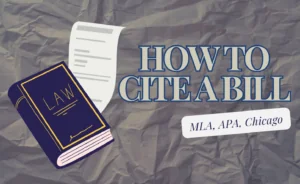When just getting into academic writing, one often faces the challenge of properly referencing and citing sources. These practices help attribute credit where it’s due and allow readers to verify information and further explore the topic. You need to know the one key difference: a citation is a brief mention of a source within the text, while a reference is a complete listing of the source details at the end of the document.

✅ AI Essay Writer ✅ AI Detector ✅ Plagchecker ✅ Paraphraser
✅ Summarizer ✅ Citation Generator
Similarities and Differences
It’s first helpful to recognize the common ground between citations and references. You can also opt to use a free citation generator tool. Both are widely used in academic texts as guideposts to the information sources. You will also find that most of the time, citations and references are interconnected, each pointing to the (same) original source material.
However, their purposes, locations, and information depth set them apart:
🎯 Purpose: Citations highlight where the information was taken from; references provide a detailed info on the source.
📍 Location: Citations are embedded in the text; references are included at the document’s end.
📚 Amount of Information: Citations are brief; references have an extended list of details about the source.
✍️ Length: Citations are short; references can extend to several lines.
🔄 Mutual Referencing: Citations might exist without direct references (e.g., personal communications); every reference should correlate with a citation.
Definition of Citation
Citations are markers within the text that signal the reader to an external source of information. These are basically abbreviated references, which are most often included in parentheses. You will see that they are referred to as “in-text citations” and include essential information such as the author’s last name and the year of publication. Sometimes, in-text citations will only include a number in squared brackets. This depends on the style the paper was formatted in.
Their primary function is to credit the original creator of an idea, fact, or figure, while simultaneously allow the readers to trace the information back to its source for further examination.
Citations are brief notations within a text that attribute ideas or information to their original sources, guiding readers to further detail and establish academic integrity.
Here’s an example of variously formatted in-text citations:
| Citation Style | Example |
|---|---|
| APA | (Smith, 2020) |
| MLA | (Smith 123) |
| Chicago | (Smith, 2020, p.123) |
| Harvard | (Smith 2020) |
| Vancouver | [1] |
Definition of Reference
References are a more structured way to acknowledge the work of others and to provide readers with the context necessary to understand the basis of the claims or arguments presented. They differentiate the author’s original thoughts from the ideas, data, and theories drawn from external sources.
The inclusion of references at the end of a document, most of the times organized alphabetically by the authors’ last names (other times, in the order they appear in text), grants the writer with credibility and scholarly rigor.
References improve the credibility of a document by crediting original sources and providing readers with pathways to get further information.
Now, take a look at how references usually look like (in different formats, of course):
| Reference Style | Example |
|---|---|
| APA | Smith, J. (2020). Title of Work. Publisher. |
| MLA | Smith, John. Title of Work. Publisher, 2020. |
| Chicago | Smith, John. 2020. Title of Work. City of Publication: Publisher. |
| Harvard | Smith, J., 2020. Title of Work. Publisher. |
| Vancouver | 1. Smith J. Title of Work. City of Publication: Publisher; 2020. |
Comparison of Citations and References
Now, for a more convenient memorization, we’ve created a comparison table that shows the key differences between citations and references
| Basis for Comparison | Citation | Reference |
|---|---|---|
| Meaning | Identifies source within the body. | Lists all sourced materials at the end. |
| Use | Informs readers of the information’s origin. | Provides complete source details. |
| Purpose | Points to the source material. | Supports or critiques an argument. |
| Placement | Within the text, in brackets. | As an endnote or at the document’s end. |
| Information | Minimal: usually author’s last name and publication year. | Comprehensive: includes publication details, author, title, etc. |
Wrap Up
With this guide, understanding the distinctions and connections between citations and references should be a piece of cake. Just remember, if you use citations and references properly, you will support the integrity and credibility of your work and allow others to look at your findings and use them to continue the scientific dialogue within various fields of study.
FAQ
Follow us on Reddit for more insights and updates.





Comments (0)
Welcome to A*Help comments!
We’re all about debate and discussion at A*Help.
We value the diverse opinions of users, so you may find points of view that you don’t agree with. And that’s cool. However, there are certain things we’re not OK with: attempts to manipulate our data in any way, for example, or the posting of discriminative, offensive, hateful, or disparaging material.